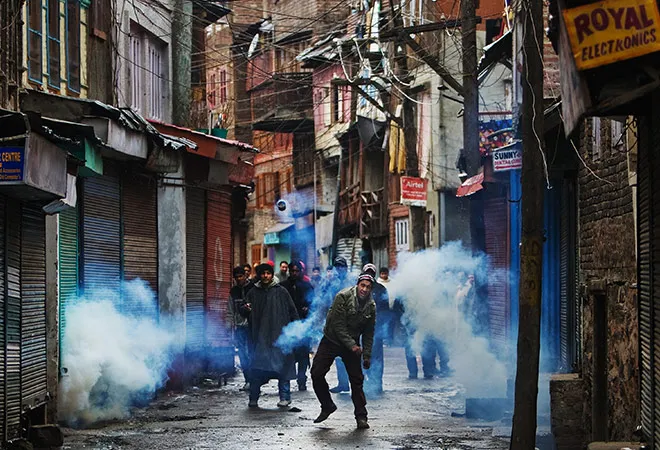
Addressing the effects of conflict exposure on mental health is a complicated affair. Nonetheless, there has been a gradual rise in understanding the importance of both preventative and curative measures to address the mental health epidemic in conflict zones. Government institutions in consultation with NGOs and practitioners of psychotherapy have taken a keen interest in developing contextual programmes aimed at addressing the psychological effects of conflict. The unprecedented turn of events that caused shockwaves across the Kashmir Valley is bound to further reinstate the importance of such endeavours.
An analysis of the current state of mental health interventions in Kashmir leads us to emphasise the importance of integrating the community into the implementation mechanisms of mental health care. The allocation of trained counsellors and specialised psychotherapists to the Valley along with programmes that raise awareness regarding the issue has been championed by institutions like the MSF foundation, government medical college (Srinagar) and Kashmir University. However, an examination of socio-cultural factors in Kashmir and ingenious mental health programmes practiced overseas leads us to believe that integrating lay workers into the implementation of community-led interventions helps reach more people. Furthermore, programmes involving the community at large are able to combat the challenges faced by conventional sources of psychological help that are often stigmatised in these regions. At a time when the Prime Minister has reached out to the youth in Kashmir with the promise of a better future, their integration into the conceptualisation of future interventions could be an important step towards improving lives in the Valley. There is a need to further strengthen some of the existing major mental health programmes in Kashmir.
Interventions by Médecins Sans Frontières (MSF)
One of the biggest projects that has been implemented in Kashmir to help combat the mental health crisis is by Médecins Sans Frontières (MSF). MSF has been actively working in Kashmir since 2001 and is committed to providing psychological first aid and counselling to victims. The organisation has greatly contributed to increasing the availability of personnel trained in psychology along with building systems to raise awareness regarding the importance of addressing these concerns of mental health. They have set up clinics in areas like Pulwama, Baramulla, Srinagar and Kakapora. A mental health
survey administered by the foundation showed that 45 percent of the adult population show symptoms of mental distress. In light of the aforementioned statistic, MSF’s work in Kashmir is important and integral to rehabilitation strategies. However, the stigma attached to conventional sources of psychological help like counselling, as championed by the MSF, is a major deterrent to spreading the ambit of psychological care in the Valley. Thus, one needs to further examine the need for decentralising mental health care in Kashmir through the integration of Lay Health Workers (LAWs), who, being locals, play a pivotal role in increasing awareness and contextualising mental health intervention programmes to the sensibilities of the victims.
The need for community-based interventions
The paucity of mental health services in Low and Middle-Income countries (LMIC’s) has been aptly
captured in the annual Global Mental Health series. Moreover, the need to increase the supply of such services is integral and MSF’s initiative is indicative of the awareness regarding its importance. However, solely relying on such large-scale mental health programmes to percolate down to the grassroots and provide long-term care is expecting too much. The decentralisation of mental health services is an important step towards combating the dearth of conventional sources of psychological help like psychiatrists and counsellors. Director General Health Services in Kashmir Dr. Saleem Ur Rehman reported such shortages in Kashmir. “We are handicapped by lack of psychiatrists and mental health professionals. IMHANS cannot cater to the entire population,” he confessed in an
article. Furthermore, an official working at the SMHS hospital in Srinagar
noted: “We have only four permanent faculty members and two others are working on an ad-hoc basis”. Thus, an increase in the provision of services is integral but should be supplemented with efforts to decentralise mental health care.
This decentralisation can be achieved through community-based intervention programmes. Such programmes essentially present an alternative to the top-down approach of traditional counselling. The programme is usually conducted with a group led by a psychologist, but implemented by trained locals. For example, to mitigate some of the effects of the Israel-Palestine conflict on civilians in Israel, the
Overshadowing the Threat to Terrorism initiative was implemented. A randomised control trial assessed the efficacy of this programme in improving symptoms of anxiety and post-traumatic stress disorder (PTSD) among pubescent victims of more than one terror attack on the school. Implemented by trained locals, the programme incorporated art therapy techniques, body-oriented strategies, and narrative approaches to document children's experiences. Positive treatment effects were reported on all variables of interest, thereby indicating the power of such initiatives.
Such community-based intervention programmes allow for long-term rehabilitation and do not merely tackle the immediate effects of conflict exposure. Most mental health clinics and counselling services are unable to forge long-term relationships with victims, partly due to a lack of accessibility with clients and the prevalent stigma associated with seeking such forms of care. The community-led programmes are able to evade the aforementioned difficulties associated with seeking psychological counselling.
A
study examining the efficacy of community-based awareness and mental health interventions in the Ganderbal district found that the integration of Pir’s into speaking about mental health was an invaluable asset in getting people to take their feelings seriously. The researchers asked a group of locals to brief local Imams about the project and encouraged them to speak about mental health issues in the Valley during their Friday sermons. These sermons are primarily attended by those directly affected by the conflict. Thus, integrating the local community and understanding the socio-cultural uniqueness of a region while deliberating about mental health services is imperative. Moreover, empowering the locals to help with implementing intervention programmes also helps psychological care to be sensitive to the reality of the victims’ lives. Often, highly skilled psychologists may not understand the pulse of the ones they hope to help. Conversely, using skilled psychologists and programme creators to train locals who have a deep understanding of the people they hope to help make the programmes more embedded into the cultural fabric of Kashmir. Additionally, the use of community activities also allows the psychological efficacy of the programme to be behind a veil of community engagement.
Healing Kashmir
The Healing Kashmir organisation, through its
“Young Minds” initiative, was able to create a new paradigm in addressing the mental health problems of school students by integrating trained locals into the implementation of the programme. The programme used a combination of guided physical exercise routines at the start of the day and free association writing before the school day ends. Free association writing enables students to freely express themselves and release all their thoughts without the fear of being scrutinised. The physical exercise routine was tailored to combat the effects of stressors in Kashmir on the body. In conflict zones, the lack of safety and perpetual fear for one’s life
leads the body to pump adrenaline into the system as a natural response to the fight or flight response tendencies. This adrenaline haze coupled with the constant fear experienced by victims of conflict makes the body a storehouse for stress. Physical exercise accompanied with instructions fostering self-awareness of the mind and its relationship with the body helped address some of the aforementioned effects of conflict.
The programme was implemented using the assistance of locals from the Valley. This further contextualised the programme and allowed students to connect with the guides and by extension, to the programme itself more easily.
Conclusion
In light of the
recent developments in Kashmir, civilians are feeling even more alienated and perturbed by the revocation of Article 370 which led to a communication blackout that was enforced to ensure total integration of the troubled state with India. The government has to take an empathetic approach to the people in Kashmir. With Prime Minister Modi’s recent speech aiming to position the revocation to be in service of improving Kashmiri lives, the pulse of the people in the state, at least for now, does not seem to resonate with this sentiment. In an effort to compensate the further alienation, systems must be put in place to encourage community-based intervention programmes that bring people together.
The writer is a research intern at ORF, Mumbai
The views expressed above belong to the author(s). ORF research and analyses now available on Telegram! Click here to access our curated content — blogs, longforms and interviews.



 Addressing the effects of conflict exposure on mental health is a complicated affair. Nonetheless, there has been a gradual rise in understanding the importance of both preventative and curative measures to address the mental health epidemic in conflict zones. Government institutions in consultation with NGOs and practitioners of psychotherapy have taken a keen interest in developing contextual programmes aimed at addressing the psychological effects of conflict. The unprecedented turn of events that caused shockwaves across the Kashmir Valley is bound to further reinstate the importance of such endeavours.
An analysis of the current state of mental health interventions in Kashmir leads us to emphasise the importance of integrating the community into the implementation mechanisms of mental health care. The allocation of trained counsellors and specialised psychotherapists to the Valley along with programmes that raise awareness regarding the issue has been championed by institutions like the MSF foundation, government medical college (Srinagar) and Kashmir University. However, an examination of socio-cultural factors in Kashmir and ingenious mental health programmes practiced overseas leads us to believe that integrating lay workers into the implementation of community-led interventions helps reach more people. Furthermore, programmes involving the community at large are able to combat the challenges faced by conventional sources of psychological help that are often stigmatised in these regions. At a time when the Prime Minister has reached out to the youth in Kashmir with the promise of a better future, their integration into the conceptualisation of future interventions could be an important step towards improving lives in the Valley. There is a need to further strengthen some of the existing major mental health programmes in Kashmir.
Addressing the effects of conflict exposure on mental health is a complicated affair. Nonetheless, there has been a gradual rise in understanding the importance of both preventative and curative measures to address the mental health epidemic in conflict zones. Government institutions in consultation with NGOs and practitioners of psychotherapy have taken a keen interest in developing contextual programmes aimed at addressing the psychological effects of conflict. The unprecedented turn of events that caused shockwaves across the Kashmir Valley is bound to further reinstate the importance of such endeavours.
An analysis of the current state of mental health interventions in Kashmir leads us to emphasise the importance of integrating the community into the implementation mechanisms of mental health care. The allocation of trained counsellors and specialised psychotherapists to the Valley along with programmes that raise awareness regarding the issue has been championed by institutions like the MSF foundation, government medical college (Srinagar) and Kashmir University. However, an examination of socio-cultural factors in Kashmir and ingenious mental health programmes practiced overseas leads us to believe that integrating lay workers into the implementation of community-led interventions helps reach more people. Furthermore, programmes involving the community at large are able to combat the challenges faced by conventional sources of psychological help that are often stigmatised in these regions. At a time when the Prime Minister has reached out to the youth in Kashmir with the promise of a better future, their integration into the conceptualisation of future interventions could be an important step towards improving lives in the Valley. There is a need to further strengthen some of the existing major mental health programmes in Kashmir.
 PREV
PREV


